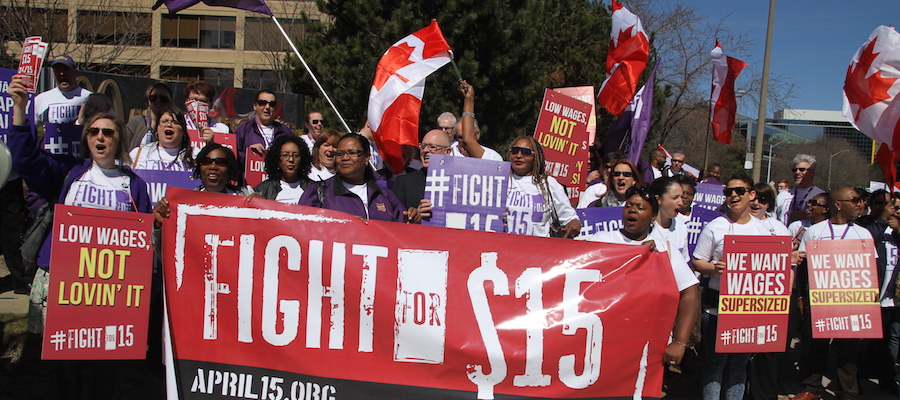Historic gains in Ontario workers’ rights: What BC can learn

In light of the growth and prevalence of precarious employment and the lack of decent conditions of employment for vulnerable workers, labour advocates and unions in Ontario campaigned for improvements to employment and labour relations laws. As a result of their campaign, in February 2015, Ontario’s provincial government established an independent review headed by two special advisors of the Employment Standards Act and Labour Relations Act. The mandate of the Changing Workplaces Review Special Advisors was to consider the needs of vulnerable workers in precarious work and the need to support business in the Ontario economy.
The Special Advisors then consulted experts in a variety of fields, engaged with leading academics who focus on workplace issues, commissioned several research projects, held 12 public sessions across the province, received over 200 public presentations, and received over 300 written submissions. Throughout this consultation process there was also a broad-based “Fight for $15 and Fairness” minimum wage and benefits campaign.
An interim report was produced by the Special Advisors in July 2016, and a final report of 419 pages containing 173 recommendations was released on May 23, 2017. This report was quickly followed by an Ontario government announcement that it intended to act on many of the Special Advisors’ recommendations, and then on June 1st introduced legislation to create “Fair Workplaces, Better Jobs.”
Recommendations were based on consultation with experts and leading academics, several research projects, public sessions across the province, and hundreds of public presentations and written submissions.
Among the Special Advisor’s recommendations for change in the Employment Standards Act were the following:
- Equal pay for part-time, casual, temporary, contract and seasonal employees, and for temporary help agency employees after six months, relative to rates of pay of full-time employees performing the same work for the same employer;
- Sectoral regulation of scheduling, giving priority to the retail and fast food sectors, to provide workers with minimum notice of schedule changes and fair minimum shift times;
- The right of employees after one year of service to request a decrease or an increase in hours of work, be given a more flexible schedule, or alter the location of work, and a requirement that the employer provide written reasons if the request is denied;
- Improved termination and severance pay provisions for temporary agency employees.
- Extension of Personal Emergency Leave to all employees and to include domestic violence as a reason for absence;
- An increase in unpaid Family Medical Leave from eight weeks in a 26 week period to 26 weeks in a 52 week period;
- An increase in paid annual vacation to three weeks after five years of service;
- That the Ministry of Labour make misclassification of employees as independent contractors a priority enforcement issue, and that the definition of “employee” include “dependent contractor;” and
- That the exclusion of interns, trainees and crown employees from the Act be eliminated.
Although the Special Advisors did not deal with the general minimum wage rate they did recommend elimination of the lower minimum wage rates for students under 18, home workers, and liquor servers.
The report’s strongest recommendations regarding employment standards dealt with the need for a “strategic enforcement” regime designed to address non-compliance at a systematic level and not only on the basis of complaints. They argued this should be achieved by, among other measures, allocating more resources to proactive enforcement, and increasing the use of targeted inspections particularly in sectors where there are large numbers of vulnerable and precariously employed workers. The report also recommended elimination of the “self-help” requirement in the employee complaint filing process (much like we have in BC), and an expedited and accessible complaints handling procedure for temporary foreign workers to address alleged reprisals that result in termination or unjust dismissal prior to repatriation under the terms of their temporary work permit.
In response to the above recommendations, the Ontario government announced that it would increase the general minimum wage to $15.00 on January 1, 2019. It also announced that it would introduce a Fair Workplaces, Better Jobs Act.
Among the most significant recommendations with respect to the Labour Relations Act was the extension of collective bargaining rights to domestic workers, hunters and trappers, farm workers and certain professional employees; the extension of union successor rights to contracted-out services such as building security, food services, cleaning and government-funded home care; and measures to make it easier for workers to be unionized.
While this report made a large number of recommendations for progressive changes to the Ontario Employment Standards Act, administration and enforcement of the Act, and the Labour Relations Act, it did not go far enough with respect to improvements to basic minimum standards and exclusions. For example, it did not recommend for paid sick leave days, adequate paid vacation, and “just cause” termination protection for all workers. Neither did it recommend for the Labour Relations Act reintroduction of card-based certification of unions, the introduction of broad-based sectoral collective bargaining rights, or the prohibition of replacement workers during a strike or lock-out.
On May 30th, in response to the above recommendations, the Ontario government announced that it would increase the general minimum wage to $11.60 on October 1, 2017, to $14.00 on January 1, 2018, and to $15.00 on January 1, 2019. It also announced, with respect to other employment standards, that it would introduce a Fair Workplaces, Better Jobs Act in the legislature on June 1st.
However, the proposed changes to employment standards basic rights do not go far enough, and in some cases do not even go as far as recommended by the Changing Workplaces Review Special Advisors. For example, the lower minimum wages for students under 18, for home workers, and for liquor servers will not be eliminated, as had been recommended by the Special Advisors. The positive changes to basic rights in the proposed legislation include a $15 minimum wage within 18 months; equal pay for equal work regardless of employment status for casual, part-time, temporary, seasonal and temporary help agency employees; new work scheduling rules; prohibition against misclassification of employees as “independent contractors;” elimination of the self-help complaint requirement; increased penalties for non-compliance; and the hiring of up to 175 more employment standards officers to engage in pro-active enforcement of the Act.
The proposed new legislation tabled in Ontario represents a partial but important victory for the campaigns of workers advocates and unions in that province.
On balance the proposed new employment standards and labour relations legislation tabled in the Ontario legislature establish historic gains in workers’ rights and represent a partial but important victory for the campaigns of workers advocates and unions in Ontario. All of it is a far cry from where we are in BC, and offers guideposts for a new BC government seeking to remedy the poor state of employment standards in our province.
Topics: Employment & labour


